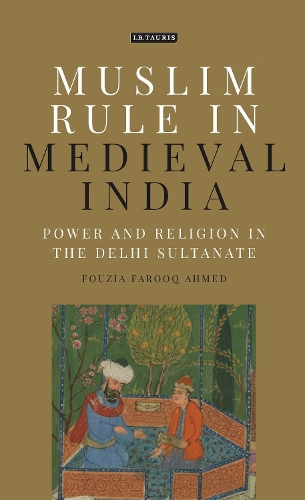
Muslim Rule in Medieval India: Power and Religion in the Delhi Sultanate
(Hardback)
Available Formats
Publishing Details
Muslim Rule in Medieval India: Power and Religion in the Delhi Sultanate
By (Author) Fouzia Farooq Ahmed
Bloomsbury Publishing PLC
I.B. Tauris
27th September 2016
United Kingdom
Classifications
Tertiary Education
Non Fiction
954.023
Physical Properties
Hardback
304
Width 144mm, Height 218mm, Spine 28mm
500g
Description
The Delhi Sultanate ruled northern India for over three centuries. The era, marked by the desecration of temples and construction of mosques from temple-rubble, is for many South Asians a lightning rod for debates on communalism, religious identity and inter-faith conflict. Using Persian and Arabic manuscripts, epigraphs and inscriptions, Fouzia Farooq Ahmad demystifies key aspects of governance and religion in this complex and controversial period. Why were small sets of foreign invaders and administrators able to dominate despite the cultural, linguistic and religious divides separating them from the ruled And to what extent did people comply with the authority of sultans they knew very little about By focusing for the first time on the relationship between the sultans, the bureaucracy and the ruled Muslim Rule in Medieval India outlines the practical dynamics of medieval Muslim political culture and its reception. This approach shows categorically that sultans did not possess meaningful political authority among the masses, and that their symbols of legitimacy were merely post hoc socio-cultural embellishments.Ahmad's thoroughly researched revisionist account is essential reading for all students and researchers working on the history of South Asia from the medieval period to the present day.
Reviews
'In this meticulous study, Fouzia Farooq Ahmed analyses the structure and dynamics of Muslim domination in India. Dr. Ahmed's survey deftly depicts the obstacles to establishing a stable foundation of authority in a political landscape of kaleidoscopic complexity, comprised of Turkish military slaves, Afghan warlords, Hindu notables, Indo-Muslim powerbrokers, Persian administrators, and Arab religious experts. What emerges from her sifting through the chronicles is a story of sultans and warlords pursuing the elusive formula for lasting power and falling short because of the fragility of patrimonial alliances, vast distances between center and province, and Mongol military pressure from Central Asia.' - David Commins, Professor of History, Dickinson College
Author Bio
Fouzia Farooq Ahmed is Lecturer in the Department of History at Quaid-i-Azam University, Islamabad, where she received her PhD. She has published several articles in peer-reviewed journals on the topic of the Delhi sultanate.
